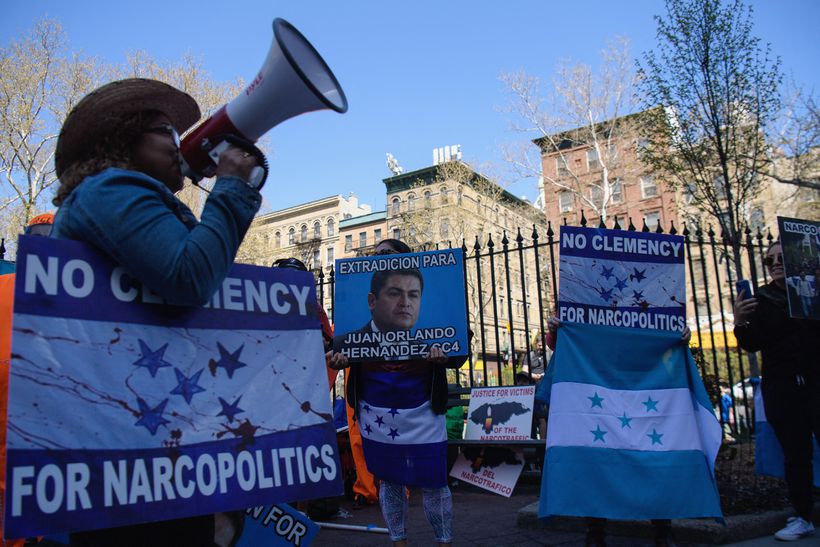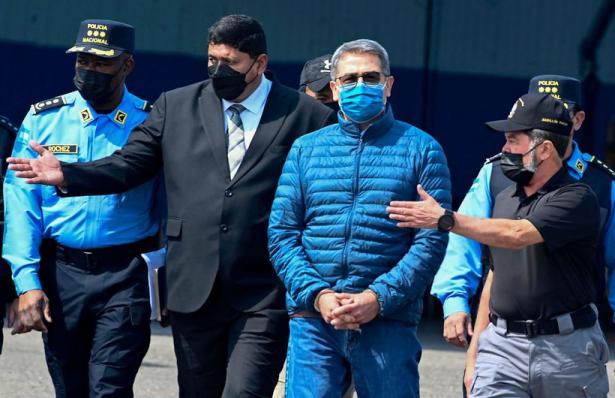In an extraordinary turn of events, a former head of state was brought to the United States last week to face serious criminal charges.
It’s an extremely rare occurrence. Notoriously, three decades ago, Panamanian dictator Manuel Noriega surrendered to American forces during a US invasion and was convicted in federal court of drug trafficking, racketeering, and money laundering. He served roughly 17 years in a Florida federal prison.
Noriega remained the only Latin American former head of state indicted by the United States. Until last week, that is, when the former president of Honduras, Juan Orlando Hernández, was put on a US Drug Enforcement Administration plane and flown to New York after the Central American country’s Supreme Court ratified his extradition. The arrest and extradition had been requested in February by US federal authorities, less than a month after Hernández stepped down from office. Hernández faces drug trafficking and weapons federal charges.
Make no mistake, the extradition of Hernández after eight years as president brings a measure of justice to Hondurans and signals a broader sense of hope.
What’s remarkable is how the US government evidently turned on Hernández. He went from being one of the strongest American allies in the region to an alleged criminal who “participated in a corrupt and violent drug-trafficking conspiracy to facilitate the importation” of more than 500 tons of US-bound cocaine, according to prosecutors in the Southern District of New York.
Hernández, the document alleges, had overseen an illegal drug trafficking empire since at least 2004. The indictment raises an immediate question: While Hernández turned Honduras into a narco-state, where were US authorities?
The accusations against Hernández are explosive. And they provide validation to what many advocates in Honduras and the United States have been clamoring about for years: There is a direct correlation between the mass migration of Hondurans to the United States in recent years and Hernández’s narco-state.
“For more than a decade, we and other civil society organizations have been highlighting how deeply dysfunctional Honduran institutions had become,” said Patricia Montes, executive director of Centro Presente, an immigrant rights group in Massachusetts. Part of Montes’s work has been to raise awareness of the complex sociopolitical reality in Honduras in order to enhance the simplistic understanding that most Americans have of why migrants leave Central America.
Last year, more Hondurans arrived at the southern border than migrants from any other country except Mexico. They are fleeing high levels of violence and poverty. Analysts have called Honduras “one of the most important drug trafficking operation centers between South America and Mexico,” and its former president is accused of having been at the center of it all.
“Honduras slowly stopped being a democracy,” Montes said. “And there is a close link between Honduras’s narco-dictatorship, the governmental dysfunction and corruption, and the Honduran migrant caravans.”

One need only look at what Hernández is accused of in federal court. US prosecutors allege that he received millions of dollars from several criminal organizations, including from the Sinaloa Cartel, and that he used those illegal proceeds to “enrich himself, finance his political campaigns, and commit voter fraud,” including in the presidential elections he won in 2013 and 2017; and that he corrupted government institutions and directed them to protect and assist in drug-related criminal activities. This resulted in brutal violence committed without consequence across the country for years — and Hernández allowed it, according to the indictment.
Hernández, who claims innocence, will have his day in court eventually. It doesn’t bode well for him that his brother, a former congressman, has already been convicted of similar charges in a federal court and sentenced to life in prison.
But the United States is complicit too.
The long history of American interventions in the region can’t be ignored. This chapter of modern US involvement in Honduras began in 2009, when a US-backed coup ousted then-President Manuel Zelaya, a leftist who happens to be the husband of current Honduran President Xiomara Castro. It was around this time that Hernández became the leader of the national Congress.
From then on, when Hernández became president and was reelected amid serious fraud allegations (and a Facebook manipulation campaign, no less), the US government stood by and supported and legitimized him.
All of the above amounts to a profound debt the United States owes Honduras. “This is a pending assignment that US authorities now have,” said Montes, who is not arguing for more US intervention but a true collaboration to help rebuild democracy in Honduras.
She is right. The extradition of Hernández should be the beginning of a new dynamic with Castro’s administration. Both partners should work hand-in-hand to dismantle the deep corruption that Hernández allowed to fester with impunity. Otherwise, Hondurans will keep showing up at our doors desperate for help.
===
Marcela García can be reached at marcela.garcia@globe.com. Follow her on Twitter @marcela_elisa and on Instagram @marcela_elisa.


Spread the word